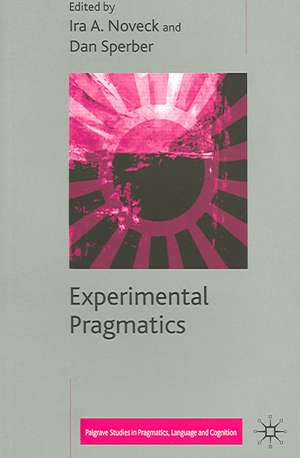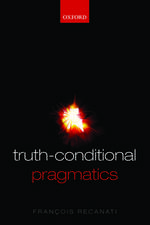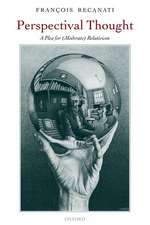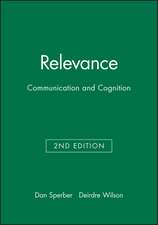Experimental Pragmatics: Palgrave Studies in Pragmatics, Language and Cognition
Editat de I. Noveck, D. Sperberen Limba Engleză Paperback – oct 2004
| Toate formatele și edițiile | Preț | Express |
|---|---|---|
| Paperback (1) | 641.53 lei 6-8 săpt. | |
| Palgrave Macmillan UK – oct 2004 | 641.53 lei 6-8 săpt. | |
| Hardback (1) | 645.28 lei 6-8 săpt. | |
| Palgrave Macmillan UK – oct 2004 | 645.28 lei 6-8 săpt. |
Din seria Palgrave Studies in Pragmatics, Language and Cognition
- 20%
 Preț: 755.73 lei
Preț: 755.73 lei - 15%
 Preț: 642.18 lei
Preț: 642.18 lei -
 Preț: 387.75 lei
Preț: 387.75 lei -
 Preț: 387.75 lei
Preț: 387.75 lei -
 Preț: 390.63 lei
Preț: 390.63 lei -
 Preț: 386.39 lei
Preț: 386.39 lei -
 Preț: 393.52 lei
Preț: 393.52 lei -
 Preț: 396.40 lei
Preț: 396.40 lei - 15%
 Preț: 641.85 lei
Preț: 641.85 lei -
 Preț: 419.21 lei
Preț: 419.21 lei - 15%
 Preț: 640.88 lei
Preț: 640.88 lei -
 Preț: 385.47 lei
Preț: 385.47 lei -
 Preț: 386.81 lei
Preț: 386.81 lei - 15%
 Preț: 644.30 lei
Preț: 644.30 lei -
 Preț: 391.40 lei
Preț: 391.40 lei -
 Preț: 422.31 lei
Preț: 422.31 lei - 15%
 Preț: 701.90 lei
Preț: 701.90 lei -
 Preț: 453.39 lei
Preț: 453.39 lei - 18%
 Preț: 946.87 lei
Preț: 946.87 lei - 15%
 Preț: 643.00 lei
Preț: 643.00 lei -
 Preț: 387.58 lei
Preț: 387.58 lei -
 Preț: 394.51 lei
Preț: 394.51 lei -
 Preț: 393.52 lei
Preț: 393.52 lei - 15%
 Preț: 644.18 lei
Preț: 644.18 lei
Preț: 641.53 lei
Preț vechi: 754.74 lei
-15% Nou
Puncte Express: 962
Preț estimativ în valută:
122.77€ • 126.66$ • 103.91£
122.77€ • 126.66$ • 103.91£
Carte tipărită la comandă
Livrare economică 04-18 martie
Preluare comenzi: 021 569.72.76
Specificații
ISBN-13: 9781403903518
ISBN-10: 1403903514
Pagini: 348
Ilustrații: VIII, 348 p.
Dimensiuni: 140 x 216 x 19 mm
Greutate: 0.45 kg
Ediția:2004
Editura: Palgrave Macmillan UK
Colecția Palgrave Macmillan
Seria Palgrave Studies in Pragmatics, Language and Cognition
Locul publicării:London, United Kingdom
ISBN-10: 1403903514
Pagini: 348
Ilustrații: VIII, 348 p.
Dimensiuni: 140 x 216 x 19 mm
Greutate: 0.45 kg
Ediția:2004
Editura: Palgrave Macmillan UK
Colecția Palgrave Macmillan
Seria Palgrave Studies in Pragmatics, Language and Cognition
Locul publicării:London, United Kingdom
Cuprins
Introduction; I.Noveck & D.Sperber PART I: PIONEERING APPROACHES Changing Ideas about Reference; H.H.Clark & A.Bangerter On the Automaticity of Pragmatic Processes: A Modular Proposal; S.Glucksberg Psycholinguistic Experiments and Linguistic Pragmatics; R.W.Gibbs Jr. Reasoning, Judgment and Pragmatics; G.Politzer Exploring Quantifiers: Pragmatics Meets the Psychology of Comprehension; A.J.Sanford & L.Moxey PART II: CURRENT ISSUES IN EXPERIMENTAL PRAGMATICS Testing the Cognitive and Communicative Principles of Relevance; J-B.Van der Henst & D.Sperber Contextual Strength: The Whens and Hows of Context Effects; O.Peleg, R.Giora & O.Fein Electrophysiology and Pragmatic Language Comprehension; S.Coulson Speech Acts in Children: The Example of Promises; J.Bernicot & V.Laval Reasoning and Pragmatics: The Case of Even If ; S.J.Handley & A.Feeney PART III: THE CASE OF SCALAR IMPLICATURES Implicature, Relevance, and Default Pragmatic Inference; A.L.Bezuidenhout & R.K.Morris Semantic and Pragmatic Competence in Children's and Adults' Comprehension of 'or'; G.Chierchia, M.T.Guasti, A.Gualmini, L.Meroni , S.Crain & F.Foppolo Pragmatic Inferences Related to Logical Terms; I.A.Noveck Conversational Implicatures: Nonce or Generalized?; A.Reboul Index
Recenzii
Reviews of the hardback edition:
'If you want to understand how your knowledge of the world shapes your use of language and your grasp of its deepest significance, read this book. Experimental pragmatics began in the 1960's; forty years on, this book marks its coming of age. Its leading practitioners show that pragmatics is far from a peripheral topic but integral to the fundamental mechanisms of language. The chapters are accessible, and the book will provide the basis for an excellent course in experimental pragmatics.' - Professor P. N. Johnson-Laird, Department of Psychology, Princeton University, USA
'Psycholinguists have been investigating the pragmatics of discourse since the early seventies; but it is only recently that linguists working in that area have felt the need to resort to psychological experiments to test their models. Experimental psychology and linguistic pragmatics interact also in the study of reasoning. A new field is emerging - experimental pragmatics - to which this book, the first of its kind, provides an exciting and most welcome introduction.' - Professor Francois Recanati, Institut Jean-Nicod, France
'If you want to understand how your knowledge of the world shapes your use of language and your grasp of its deepest significance, read this book. Experimental pragmatics began in the 1960's; forty years on, this book marks its coming of age. Its leading practitioners show that pragmatics is far from a peripheral topic but integral to the fundamental mechanisms of language. The chapters are accessible, and the book will provide the basis for an excellent course in experimental pragmatics.' - Professor P. N. Johnson-Laird, Department of Psychology, Princeton University, USA
'Psycholinguists have been investigating the pragmatics of discourse since the early seventies; but it is only recently that linguists working in that area have felt the need to resort to psychological experiments to test their models. Experimental psychology and linguistic pragmatics interact also in the study of reasoning. A new field is emerging - experimental pragmatics - to which this book, the first of its kind, provides an exciting and most welcome introduction.' - Professor Francois Recanati, Institut Jean-Nicod, France
Notă biografică
ADRIAN BANGERTER Groupe de Psychologie Appliquée, Université de Neuchâtel, SwitzerlandJOSIE BERNICOT Laboratoire de Psychologie, Langage et Cognition, Université de Poitiers, FranceANNE L. BEZUIDENHOUT Department of Philosophy, University of South Carolina, USAGENNARO CHIERCHIA, Dipartimento di Psicologia, Università di Milano-Bicocca, ItalyHERBERT H. CLARK Department of Psychology, Stanford University, USASEANA COULSON Cognitive Science Department, University of California San Diego, USASTEPHEN CRAIN Department of Linguistics, University of Maryland, USAAIDAN FEENEY Department of Psychology, University of Durham, UKOFER FEIN Academic College of Tel Aviv Yaffo, IsraelFRANCESCA FOPPOLO Università di Milano-Bicocca, Italy RAYMOND W. GIBBS Jr. Department of Psychology, University of California Santa Cruz, USARACHEL GIORA Department of Linguistics, Tel Aviv University, IsraelSAM GLUCKSBERG Department of Psychology, Princeton University, USAANDREA GUALMINI Department of Linguistics and Philosophy, MIT,USAMARIA TERESA GUASTI Dipartimento di Psicologia, Università di Milano-Bicocca, ItalySIMON J. HANDLEY Department of Psychology, University of Plymouth, UKVIRGINIE LAVAL Laboratoire de Psychologie, Langage et Cognition, Université de Poitiers, FranceLUISA MERONI Department of Linguistics, University of Maryland, USAROBIN K. MORRIS Department of Psychology, University of South Carolina, USALINDA MOXEY Department of Psychology, Universityof Glasgow, UKORNA PELEG Department of Linguistics, Tel Aviv University, IsraelGUY POLITZER Laboratoire Cognition et Usages, CNRS, Université de Paris, FranceANNE REBOUL Institut des Sciences Cognitives, Lyon, FranceA.J. SANFORD Department of Psychology, University of Glasgow, UKJEAN-BAPTISTE VAN DER HENST Institut des Sciences Cognitives, Lyon, France













